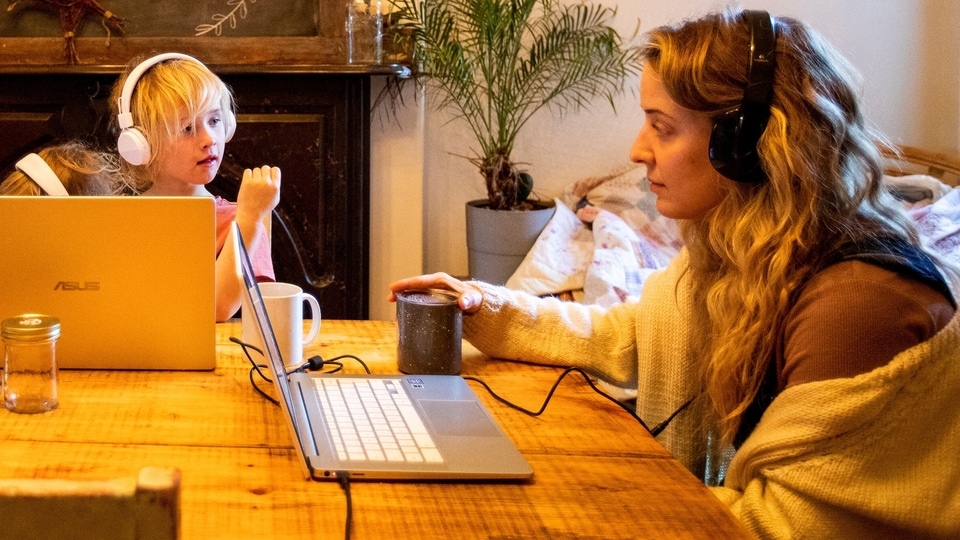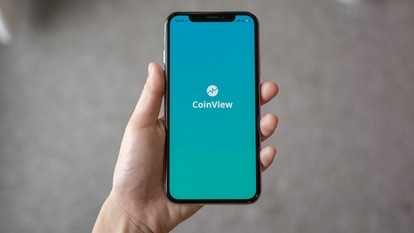Work-from-home revolution has been mostly a phenomenon of the affluent
Remote Schooling’s Perverse Social Divide: Those least able to work from home were most likely to have kids in remote school last spring.

The pandemic-induced work-from-home revolution of the past two years has been mostly a phenomenon of the affluent and the educated. That's not exactly news, but was reinforced this month with some new Bureau of Labor Statistics data.
These numbers come from the latest iteration, conducted from February through May of last year, of a long-running longitudinal survey of 8,984 people born in the U.S. from 1980 through 1984. That explains why it's only 37-to-41-year-olds. There is no timely, complete government data(1)on how many Americans of all ages are working from home, so it's useful to know that 25.3% of those ages 37 through 41 did so exclusively the week before they were surveyed and 21.3% did so part of the time. Those with bachelor's degrees and higher were about three times likelier to have worked from home than those who didn't go to college.
Because this cohort currently includes lots of parents of school-age children, there's more useful pandemic-related information that can be gleaned from it. The survey takers asked the parents in the group whether their kids had attended in-person classes or done remote schooling in the previous week, and the responses when broken down by educational attainment (a flawed but indispensable proxy for socioeconomic class) and race are pretty enlightening.
Here are the numbers for remote schooling by the parent's education:
Some parents reported that their kids did both remote and in-person school, so just to be complete, here are the in-person schooling numbers.
Apart from some quirks with the some-college-or-associate degree group, the picture is clear, and it seems a bit perverse. Parents with lower education levels, who were less likely to be able to work from home and thus supervise their kids there while keeping their jobs, were more likely to have kids doing remote school and less likely to have kids attending in-person school. The same holds when you sort the respondents by race and ethnicity.
The obvious explanation for all this is that urban school districts were the most apt to keep instruction entirely or partly remote during the 2020-2021 school year, and urban districts still tend to have poorer, more diverse populations than suburban ones (rural districts often serve poor, less-educated communities too but don't educate enough students to have a big impact on the overall numbers).
The turn to remote schooling in urban districts wasn't entirely imposed from above. Polling during the pandemic has consistently showed Black and Hispanic parents to be more receptive to remote schooling and less enthusiastic about the return to in-person classes than White parents. Age-adjusted Covid-19 death rates have been higher for Blacks and Hispanics than non-Hispanic Whites, and were much higher during the first year of the pandemic, so concern about children catching the disease and spreading it at home has been understandably higher too.
The debate over remote schooling is flaring up again because of school closures related to the omicron wave of Covid-19. Brief school shutdowns during infectious-disease outbreaks have a long history in the U.S., and seem sensible enough right now. The long-term shift to remote schooling because of the pandemic was something else, an unprecedented experiment that has come under increasing criticism.
The fact that kids whose parents couldn't work remotely were the most likely to be subjects of this experiment does lead one to think that it wasn't really designed with those kids' and parents' interests in mind. Then again, people who couldn't work remotely were much more likely to lose their jobs during the first year of the pandemic, with employment rates falling most sharply for Black and Hispanic women and women with high school degrees only. Thanks to unprecedented levels of federal aid, this didn't necessarily spell financial disaster for them. For white-collar parents working from home, remote school has been mostly a hassle. For at least some blue-collar parents temporarily out of a job, it may have been a welcome shelter from the storm of the pandemic.
The BLS has a monthly count of the percentage of employed people who 'who teleworked or worked at home ... because of the coronavirus pandemic' (11.1% in December) but that doesn't include those working at home for other reasons and also doesn't distinguish between an hour of remote work and a full week. The Census Bureau has an annual count of those who worked primarily at home as part of its Means of Transportation to Work statistics from the American Community Survey, but the most recent numbers (15.8% of workers) are from 2020 and come with a data-reliability warning because of pandemic-related surveying challenges.
Justin Fox is a Bloomberg Opinion columnist covering business. He was the editorial director of Harvard Business Review and wrote for Time, Fortune and American Banker. He is the author of “The Myth of the Rational Market.”
Catch all the Latest Tech News, Mobile News, Laptop News, Gaming news, Wearables News , How To News, also keep up with us on Whatsapp channel,Twitter, Facebook, Google News, and Instagram. For our latest videos, subscribe to our YouTube channel.

























